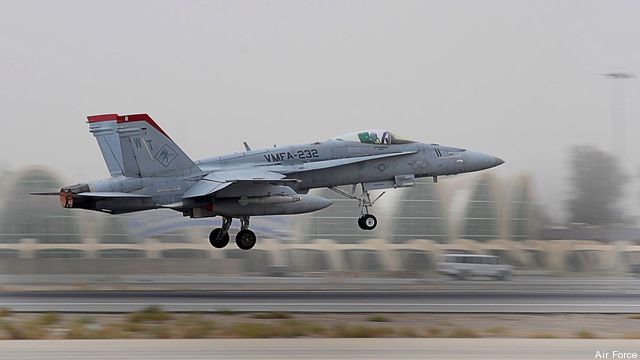
[UPDATED with details on latest strikes] Yesterday, President Obama ordered humanitarian airdrops to Iraqi refugees and authorized — but did not actually launch — airstrikes on Islamic State forces threatening either the refugees or Erbil, the capital of quasi-independent Kurdistan. This morning, at 6:45 am Washington time, the other shoe dropped, in the form of 500-pound smart bombs from Navy or Marine Corps F/A-18 fighters like the one pictured above. [UPDATED 11:00 am: A defense official just confirmed to me that “the strikes were conducted by Navy F/A-18 aircraft from USS George H. W. Bush,” a Nimitz-class carrier named after the president who ousted Saddam Hussein from Kuwait in 1991 but decided against invading Iraq itself.]
Ironically, the target, “mobile artillery” advancing on Erbil (aka Irbil), was quite possibly the US-funded Iraqi Army equipment that the self-proclaimed Islamic State has captured. (It’s also possible it could be former Syrian Army equipment, but that would have had farther to go to reach the Kurdish front).
[UPDATED 4:15 pm: In subsequent strikes, armed drones “eliminated” Islamic State mortarmen while four more F/A-18s bombed seven vehicles and another mortar position near Erbil.]
If anyone doubted we are finally — for good or ill — reengaged in the Iraqi civil war we set off inadvertently 11 years ago, those doubts are gone. While both Obama and the Pentagon took care to frame strikes as protecting US personnel, diplomatic and otherwise, in Erbil, there’s no way to protect Americans in the Kurdish capital without protecting the capital as well. That we’ve intervened first in Kurdistan is unsurprising: The Kurds have been most pro-American faction in Iraq since 1991, when the US established no-fly zones and sent aid to protect them from Saddam Hussein.
It’s worth noting that US intervention in ’91 came to late to save the Shia in southern Iraq, something the Shia-dominated government in Baghdad can’t help remembering as it wonders when the US will start protecting it. But the administration is praying that Prime Minister Maliki does not cling to power in the new government now being formed. Airstrikes on the Baghdad front now might be construed as a gesture of support for Maliki, a Shia chauvinist whose oppression of Sunnis led many to support the Islamic State.

Air Force cyber resilience in focus
Cyber resilience has become a frontline mission for the US military. Breaking Defense’s new eBook rounds up key reporting from the 2025 Alamo ACE conference with the latest developments in cyber offense and defense.
Here’s the full statement from the Pentagon’s senior spokesman, Adm. John Kirby:
“At approximately 6:45 a.m. EDT, the U.S. military conducted a targeted airstrike against Islamic State of Iraq and the Levant (ISIL) terrorists.
“Two F/A-18 aircraft dropped 500-pound laser-guided bombs on a mobile artillery piece near Erbil. ISIL was using this artillery to shell Kurdish forces defending Erbil where U.S. personnel are located.
“The decision to strike was made by the U.S. Central Command commander under authorization granted him by the commander in chief.
“As the president made clear, the United States military will continue to take direct action against ISIL when they threaten our personnel and facilities.”
[Updated 4:20 pm: And here’s Kirby’s second statement this afternoon:
“The U.S. military continued to attack ISIL targets near Erbil today conducting two additional air strikes to help defend the city where U.S. personnel are assisting the Government of Iraq.
“Shortly after 10 a.m. EDT, remotely piloted aircraft struck a terrorist mortar position. When ISIL fighters returned to the site moments later, the terrorists were attacked again and successfully eliminated.
“At approximately 11:20 a.m. EDT, four F/A-18 aircraft successfully struck a stationary ISIL convoy of seven vehicles and a mortar position near Erbil. The aircraft executed two planned passes. On both runs, each aircraft dropped one laser guided bomb making a total of eight bombs dropped on target neutralizing the mortar and convoy.”]